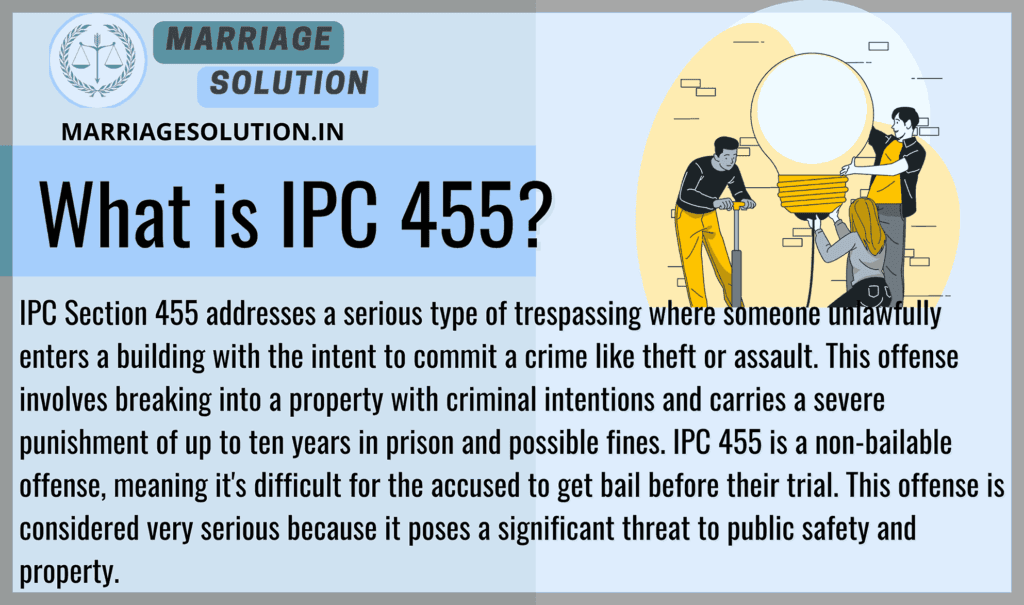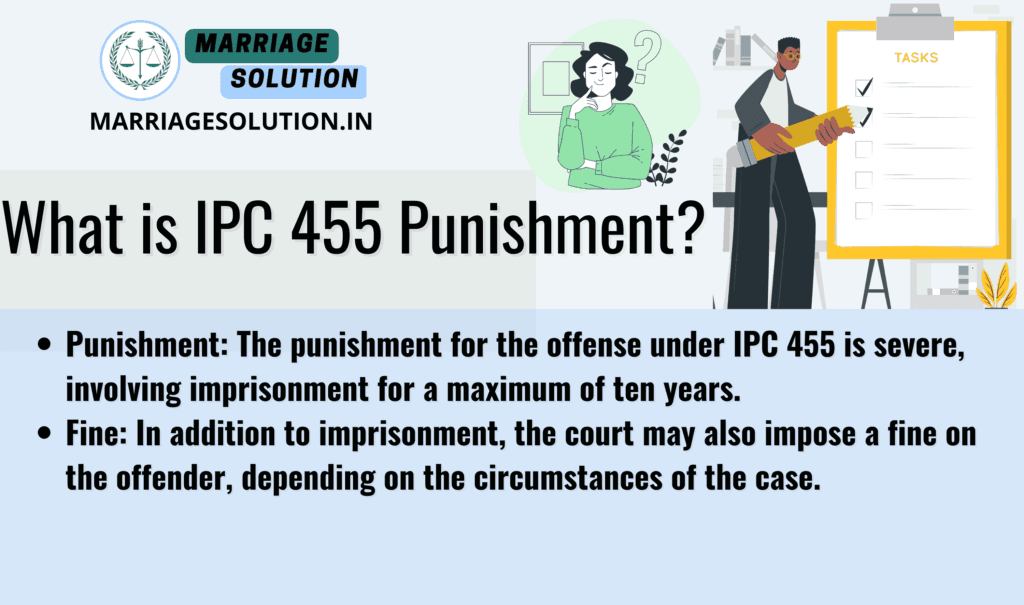Introduction of IPC Section 455
IPC Section 455 addresses a serious form of trespassing, involving breaking into a building with criminal intentions. This offense carries significant consequences, including imprisonment for up to ten years and possible fines. Understanding this section of the law is crucial for grasping the severity of such actions and their implications on public safety and property.
- Introduction of IPC Section 455
- What is IPC Section 455 ?
- IPC Section 455 Overview
- IPC 455 Punishment
- 455 IPC bailable or non bailable ?
- Section 455 IPC in short information
- IPC Section 455 FAQs
- If you need support with court proceedings or any other legal matters, don’t hesitate to reach out for assistance.
What is IPC Section 455 ?
IPC Section 455 addresses a serious type of trespassing where someone unlawfully enters a building with the intent to commit a crime like theft or assault. This offense involves breaking into a property with criminal intentions and carries a severe punishment of up to ten years in prison and possible fines. IPC 455 is a non-bailable offense, meaning it’s difficult for the accused to get bail before their trial. This offense is considered very serious because it poses a significant threat to public safety and property.

IPC Section 455 Overview
IPC Section 455 deals with a severe type of trespassing where someone illegally enters a building with the intention of committing a crime like theft or assault. This offense involves breaking into a property with criminal intentions and carries a harsh punishment of up to ten years in prison and potential fines. It is a non-bailable offense, making it challenging for the accused to obtain bail before their trial. This offense is taken seriously due to its significant threat to public safety and property.
Serious Trespassing Offense: This point emphasizes that IPC Section 455 deals with a serious form of trespassing. It’s not just about entering a building without permission; it involves breaking into the premises with clear criminal intentions. This distinction is crucial because it sets this offense apart from less severe forms of trespassing.
Breaking and Entering: Here, we’re highlighting the specific action involved in the offense. Breaking and entering signify a deliberate and forceful entry into a building or property, distinguishing it from mere unauthorized entry. This aspect underscores the gravity of the offense and the deliberate nature of the perpetrator’s actions.
Criminal Intent: This point focuses on the mental state of the offender. It’s not enough for someone to unlawfully enter a building; they must do so with the intent to commit a crime, such as theft, assault, or kidnapping. Establishing criminal intent is essential for prosecuting individuals under IPC Section 455 and ensuring appropriate punishment.
Harsh Punishment: Here, we emphasize the severity of the consequences for this offense. Offenders convicted under IPC 455 face significant penalties, including imprisonment for up to ten years and the possibility of a fine. This harsh punishment reflects the serious nature of the crime and serves as a deterrent to potential offenders.
Non-bailable Offense: This point highlights a critical aspect of the legal process concerning IPC 455. Unlike some other trespassing offenses that may allow for bail, IPC 455 is classified as a non-bailable offense. This means that individuals accused of this offense may find it challenging to secure bail before their trial, underscoring the seriousness of the charges.
Gravity of the Offense: Finally, this point underscores the broader implications of the offense. Breaking into a building with criminal intentions not only poses a direct threat to individuals and property but also jeopardizes public safety. Recognizing the gravity of the offense is essential for law enforcement, the judiciary, and society as a whole in addressing and deterring such criminal behavior.
IPC 455 Punishment
- Punishment: The punishment for the offense under IPC 455 is severe, involving imprisonment for a maximum of ten years.
- Fine: In addition to imprisonment, the court may also impose a fine on the offender, depending on the circumstances of the case.

455 IPC bailable or non bailable ?
IPC Section 455 is a non-bailable offense, which means that individuals accused under this section cannot claim an automatic right to bail. Bail is subject to the discretion of the court based on the circumstances of the case, the nature of the offense, and other relevant factors.
Section 455 IPC in short information
| Aspect | Description |
|---|---|
| Definition | House-breaking with intent to commit an offence |
| Offence | Breaking into a house, tent, or building (used for dwelling or storing property) with the intent to commit a crime. |
| Punishment | Up to 10 years imprisonment, and/or fine |
| Bailable | Generally no (Non-bailable) |
IPC Section 455 FAQs
What does IPC Section 455 address?
IPC Section 455 deals with serious trespassing where someone breaks into a building with criminal intentions.
What constitutes breaking and entering under IPC 455?
Breaking and entering involves unlawfully entering a building with the intent to commit a crime like theft or assault.
What kind of criminal intent is required under IPC 455?
The person must have clear intentions of committing a crime, such as theft, assault, or kidnapping, upon entering the building.
What is the punishment for IPC 455?
The punishment for IPC Section 455 includes imprisonment for up to ten years along with a possible fine.
Is IPC 455 a bailable offense?
IPC 455 is a non-bailable offense, making it more challenging for the accused to obtain bail.
If you need support with court proceedings or any other legal matters, don’t hesitate to reach out for assistance.
Court or any other marriage-related issues, our https://marriagesolution.in/lawyer-help-1/ website may prove helpful. By completing our enquiry form and submitting it online, we can provide customized guidance to navigate through the process effectively. Don’t hesitate to contact us for personalized solutions; we are here to assist you whenever necessary!
